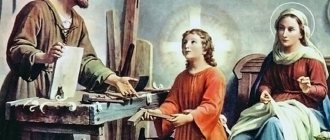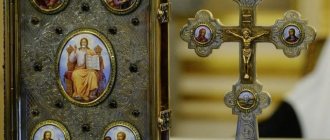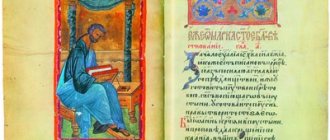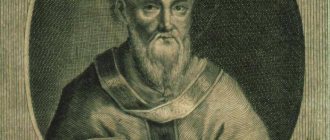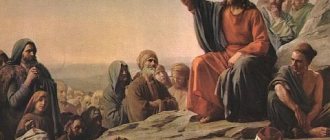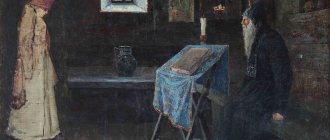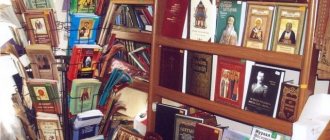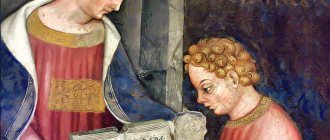Trinity leaves
This publication is part of the collection of “Trinity Leaves” published in the 19th century by the Trinity-Sergius Lavra. It contains a very detailed explanation of the Gospel of Matthew, compiled on the basis of various patristic interpretations studied and collected together. The high spiritual content and educational content allows, by general opinion, to consider it one of the best interpretations of the Holy Scriptures. The book is intended for a wide range of readers.
Who are the “Holy Fathers”
In Orthodoxy, Holy Fathers are people who dedicated their lives to church activities and through whom the Holy Spirit revealed divine truths. The history of the life of the Holy Fathers and their theological creativity is studied by the science of pathology. And their doctrinal works and views belong to the theological discipline of patristics. The statements of the Holy Fathers are in the nature of rules. Their authority is considered unshakable and their opinion has become a guideline for the Church. The holiness of their lives and fidelity to church teaching is beyond doubt.
They formed the main doctrinal principles and theological texts of Christianity, and approved the list of sacred books included in the Bible. The Fathers also interpreted the Holy Scriptures, preventing the spread of many heretical teachings.
The Russian Orthodox Church conventionally distinguishes the patristic time period, which lasted from the first centuries after the Nativity of Christ and ended around 780. At this time, John of Damascus, the last of the especially revered Holy Fathers, died. Also, some Christian ascetics who lived in the Middle Ages are counted among the Holy Fathers. Such, for example, as Simeon the New Theologian (949 – 1022) and Gregory Palamas (1296 – 1359).
The most famous of the Holy Fathers are Saints Gregory the Theologian, John Chrysostom, Basil the Great
Content
About the holy Apostle and Evangelist Matthew and his Gospel Genealogy of Jesus Christ (Matthew 1:1-17) Revelation of the secret to the righteous Joseph... (Matthew 1:18-25) Adoration of the Magi (Matthew 2:1-12) Flight to Egypt and massacre of infants (Matthew 2:13–23) Sermon of the Forerunner of the Lord (Matthew 3:1–12) Baptism of the Lord (Matthew 3:13–17) Temptation from the devil (Matthew 4:1–11) The first sermon of the Lord in Galilee (Matthew 4:12–17) The Calling of the First Apostles (Matthew 4:18–24) The Talk on the Mount and the Beatitudes (Matthew 4:25, 5:1–12) Thou shalt not kill... Leave... your gift before the altar... Go first and be reconciled... (Matt. 5:20-26) Do not commit adultery (Matt. 5:27-32) Do not break your oath (Matt. 5:33-37) Whoever strikes you on your right cheek, turn to him the other also ( Matthew 5:38–41) Give to anyone who asks you... Love your enemies... Be perfect, just as your Father in heaven is perfect (Matthew 5:42–48) Don’t let your left hand know what your right hand is doing (Matthew 6:1) –4) When you pray, do not be like the hypocrites... Pray to your Father, who is in secret... When you pray, do not say unnecessary things... (Matt. 6:5-8) Our Father (Matt. 6:9-13) You cannot serve God and mammon... (Matt. 6:22-25) Look at the birds of the air... Look at the lilies of the field... (Matt. 6:26-30) Do not worry about tomorrow... Seek first The kingdom of God and His righteousness (Matthew 6:31-34) Judge not, lest ye be judged... Why are you looking at the speck in your brother's eye (Matthew 7:1-4) You hypocrite! first take the plank out of your own eye... Do not throw your pearls before swine... (Matthew 7:5-6) Ask, and it will be given to you... Your heavenly Father will give good things to those who ask Him... (Matthew 7:7-11) So in whatever you want people to do to you, do the same to them... Enter through the narrow gate... (Matthew 7:12-14) Beware of false prophets... Not everyone who says to Me: “Lord! Lord!”, will enter the Kingdom of Heaven... (Matthew 7:15-23) Everyone who listens to My words and does them will be likened to a prudent man... Whoever listens and does not do them will be like a foolish man (Matthew 7:24-29 ) Healing of the leper (Matt. 8:1-4) Healing of the centurion's servant of Capernaum (Matt. 8:5-13) Healing of Peter's mother-in-law and many sick people... (Matt. 8:14-18) The Lord's answers to the proud scribe and the humble disciple... ( Matthew 8:19–22) The taming of the storm… (Matthew 8:23–26) The healing of two demoniacs in the country of Gergesin… (Matthew 8:28–34) The healing of the paralytic in Capernaum… (Matthew 9:1–8) The calling of Matthew... (Matthew 9:9-13) The answer to the Pharisees and John's disciples about fasting... New wine and wineskins... (Matthew 9:14-17) The healing of the bleeding woman and the resurrection of Jairus' daughter... (Matthew 9:18-26) Healing of two blind and a deaf-mute... Surprise of the people and blasphemy of the Pharisees... (Matthew 9:27-35) The harvest is plentiful, but the laborers are few... (Matthew 9:36-38) Election of the twelve apostles... (Matthew 10:1-4) Preach that the kingdom of heaven is at hand... Heal the sick... Freely you have received, freely give... (Matt. 10:5-8) Do not take with you either gold or silver... Say: peace to this house... Shake off the dust from your feet... (Matthew 10:9-15) Behold, I am sending you out like sheep among wolves... Be wise , like serpents, and simple as doves... Beware of people... (Matt. 10:16-18) Do not worry how or what to say... and you will be hated by everyone... But he who endures to the end will be saved... (Matt. 10:19-22 ) When they persecute you in one city, flee to another... There is nothing hidden that will not be revealed... Do not be afraid of those who kill the body... (Matthew 10:23-31) Whoever confesses Me before men, him will I also confess before My Father... I did not come to bring peace, but a sword... And a man’s enemies are his own household... (Matthew 10:32-36) Whoever confesses Me before men, him I will also confess before My Father... I did not come to bring peace, but a sword... And enemies a man's household... (Matthew 10:32-36) Whoever loves father or mother more than Me... He who does not take up his cross and follow Me is not worthy of Me... He who receives you, receives Me... (Matthew 10 :37–42, 11:1) The Lord’s answer to John’s disciples... Praise to the Baptist... (Matt. 11:2–15) The sorrowful word of the Lord about the unbelieving Jews... (Matthew 11:16-19) A terrible judgment on the unrepentant cities... Glorification of God the Father... (Matthew 11:20-26) The Lord reveals His Divinity to the apostles and calls to Himself those who labor and are heavy laden... (Matt. 11:27-30) The Lord protects the disciples who plucked ears of corn on the Sabbath... (Matt. 12:1-8) Healing a withered hand on the Sabbath... Is it possible to heal on the Sabbath?.. (Matt. 12:9 –14) The great humility of the Lord... Healing of the demon-possessed and dumb blind... The exposure of the blasphemy of the Pharisees... (Matthew 12:15-30) The Lord's teaching about blasphemy against the Holy Spirit, about the treasures of the heart and about idle words... (Matthew 12:31-37) ) The Lord's answer to the Pharisees who demanded a sign from heaven... (Matthew 12:38–45) Who is My Mother? and who are My brothers?.. (Matthew 12:46-50) About the parables of Christ... The parable of the sower... (Matthew 13:1-9) Interpretation of the parable of the sower and the seed... (Matthew 13:10-23) Parable about the tares... (Matthew 13:24-30) The parable of the mustard seed and the leaven... (Matthew 13:31-36) Interpretation of the parable of the tares... (Matthew 13:36-43) The parable of the hidden treasure... The parable of pearl of great price... The parable of the net... (Matthew 13:44-52) Jesus Christ in the Nazareth synagogue... (Matthew 13:53-58) The beheading of St. John, the Forerunner and Baptist of the Lord... (Matthew 14:1-13) The miraculous feeding of five thousand people... (Matthew 14:14-21) The walking of Jesus Christ and the Apostle Peter on the waters... (Matthew 14:22-33) The healing of many sick... The exposure of the Pharisees' hypocrisy... (Matthew 14:34-15: 11) The Lord’s conversation with the disciples about what defiles a person... (Matthew 15:12-20) Healing of the Canaanite daughter... (Matthew 15:21-28) Healing of many sick... (Matthew 15:29-31) Miraculous feeding four thousand people... (Matt. 15:32-39) The temptation of Jesus Christ by the Pharisees and Sadducees... (Matt. 16:1-4) About the leaven of the Pharisees and Sadducees... (Matt. 16:5-12) The great confession of Peter and the great promise of Christ... (Matthew 16:13-19) The first open word of the Lord about His efforts... The contradiction of Peter and the strict instruction to him from the Lord... (Matthew 16:20-23) If whoever wants to come after Me, deny yourself, and take up your cross, and follow Me... (Matthew 16:24) Whoever loses his life for My sake will find it... Some... will not taste death until they see the Son of Man coming in His Kingdom... (Matthew 16:25-28) Transfiguration of the Lord... (Matthew 17:1-9) The question of the apostles about the coming of Elijah... (Matthew 17:10-13) Healing of the demoniac on the new moon... (Matthew 17: 14-23) Wonderful statir... (Matt. 17:24-27) Unless you are converted and become like children, you will not enter the Kingdom of Heaven... (Matt. 18:1-9) See that you do not despise one of these little ones... The parable of the lost sheep... (Matthew 18:10-14) If your brother sins against you... tell the church; and if he does not listen to the church, then let him be to you as a pagan and a publican... (Matthew 18:15-17) The Lord gives the apostles the power to bind and loose... The Lord's teaching on congregational prayer and forgiveness of offenses... (Matthew 18:18 –22) The parable of the unmerciful lender... (Matthew 18:23-35) The Lord's journey to Judea... His teaching on the sanctity of marriage and virginity... The blessing of children... (Matthew 19:1-15) The Lord's conversation with a rich young man... Conversation with the disciples about the danger of wealth and the rewards for Christ's followers... (Matthew 19:16-30) The parable of the laborers in the vineyard... (Matthew 20:1-16) The Lord's prediction about His crucifixion... The request of the sons of Zebedee... The spiritual law of Christian primacy... (Matthew 20:17-28) Healing of the blind of Jericho... (Matthew 20:29-34) The Lord's royal entry into Jerusalem... Expulsion of merchants from the temple... Healing of the sick... Divine answer to the Pharisees... (Matthew 21:1-17) Curse barren fig tree... (Matt. 21:18-22) The crafty question of the Sanhedrin and the wise question of Christ to the Sanhedrin... (Matt. 21:23-27) The parable of the two sons sent by their father into the vineyard... (Matt. 21:28-32) The parable of the wicked husbandmen... (Matt. 21:33-46) The parable of those invited to the wedding feast... (Matt. 22:1-14) Render to Caesar the things that are Caesar's, and to God the things that are God's... (Matt. 22:15 –22) The Lord’s answer to the Sadducees about the resurrection... (Matthew 22:23-33) The Lord’s answer to the lawyer about the first and greater commandment in the Law... His question about Christ: whose Son is He?.. (Matthew 22:34-46) Warnings people and disciples from imitating the Pharisees... (Matthew 23:1-12) Woe to those who shut up the Kingdom of Heaven... Woe to those who devour the houses of widows... Woe to those who corrupt others... Woe to those who are deceitful in oaths... (Matthew 23:13-22) Woe to those who forget the most important things in the Law... Woe to those who cleanse the external and neglect the internal... Woe to the painted tombs... (Matthew 23:23-28) The Lord's prediction about the destruction of the temple... (Matthew 24:1-2) The prediction about false prophets, about the coming persecution of the apostles and other disasters... ( Matthew 24:3-13) Prediction about the spread of the Gospel, the destruction of Jerusalem and the false prophets of the last days of the world... (Matthew 24:14-26) The suddenness of the coming of Christ... Signs in the sky... The appearance of the Cross... The sound of a trumpet... The certainty of prophecy... (Matthew . 24:27-35) The unknown and unexpectedness of the last judgment... (Matt. 24:36-41) The unknown of the last hour... The parable of the servant waiting for the master... (Matt. 24:42-51) The parable of the ten virgins... (Matt. 25: 1–13) The parable of the ten virgins… (Matthew 25:1–13) The parable of the talents… (Matthew 25:14–30) An image of the Last Judgment of Christ… (Matthew 25:31–46) The last prediction of the Lord about His suffering... Secret meeting of the Sanhedrin and its decision... (Matthew 26:1-5) Supper in the house of Simon the leper... (Matthew 26:6-13) Judah's agreement with the enemies of the Lord... (Matthew 26:14-16) Last supper . Preparation of Passover... Cup of Thanksgiving... Washing of feet... Reproof of the traitor... (Matthew 26:17-25) Last Supper. Preparation of Easter... The Cup of Thanksgiving... Washing the feet... Reproaching the traitor... (Matthew 26:17-25) Institution of the Sacrament of Holy Communion... (Matthew 26:26-30) The Lord's prediction about the temptation of the disciples and the denial of Peter... (Matthew 26:31) –35) Prayer for the cup... (Matthew 26:36-44) Tradition of the Lord by Judas... (Matthew 26:45-56) Jesus Christ at the trial of Annas and Caiaphas... First meeting - at night... Mockery in the courtyard... (Matthew 26) :57-68) Threefold denial of the Apostle Peter... (Matt. 26:69-75) Sanhedrin meeting - in the morning... Verdict... (Matt. 27:1-2) The death of Judas the traitor... Village of blood... (Matt. 27:3-10) ) Jesus Christ at the trial of Pilate and Herod... (Matthew 27:11-14) Barabbas... The dream of Pilate's wife... Not this one, but Barabbas!.. Let him be crucified!.. Pilate washes his hands... A terrible oath... (Matthew 27 :15-25) The suffering of our Lord in the court of Pilate... His condemnation to crucifixion... Carrying the cross... Simon of Cyrene... (Matthew 27:26-32) Otset with gall... The crucifixion of our Lord... His prayer for the enemies... The secrets of the cross of the Lord... ( Matthew 27:33–34) The sufferings of our Lord on the Cross The division of vestments… The inscription on the cross… The reproach… (Matt. 27:35-43) Reproach from the thief... The prudent thief... Darkening of the sun... Consolation of the Mother... (Matthew 27:44-45) The voice of sorrow to God... New reproaches... Drinking vinegar... The death of our Lord... (Matthew 27:46- 50) The tearing of the veil of the temple... Earthquake... Resurrection of the dead... (Matthew 27:51-53) Confession of the centurion... (Matthew 27:54) Holy women at the cross of Christ... (Matthew 27:55-56) Holy women at the cross of Christ ... (Matt. 27:55-56) Burial of Christ... (Matt. 27:57-61) Burial of Christ... (Matt. 27:57-61) Descent of the Savior into hell... Sealing of the tomb of Christ... Custody... (Matt. 27: 62–66) Resurrection of Christ... Appearance of an Angel at the tomb... Flight of the guards... Journey of the myrrh-bearers to the tomb and the first appearances of the Lord... (Matthew 28:1-10) Bribery of the guards... (Matthew 28:11-15) Appearance of the Lord on Mount Galilee ... (Matt. 28:16–20) The appearance of the Lord on Mount Galilee... (Matt. 28:16–20)
Who are considered Holy Fathers and who are not?
In the first centuries of Christianity, there were no clear criteria for which of the Christian writers and theologians were or were not Holy Fathers. Therefore, believers, relying on the holiness of life and the wisdom of the teachers of the Church, classified their works as doctrinal dogmas. And only in 434, Presbyter Vincent of Lerins formulated a definition, which called the Holy Fathers
“Only those fathers who, living, teaching and abiding in the faith and in Catholic communion, holy, wisely, constantly, were deemed worthy either to rest with faith in Christ, or to die blessedly for Christ.”
The most famous and revered Holy Fathers include the Ecumenical Hierarchs John Chrysostom, Basil the Great and Gregory the Theologian.
John Chrysostom (347 – 407)
Origin, childhood, education
He came from a noble family living in Antioch (the territory of ancient Syria). His father Secundus was a military leader and died when John was not 3 years old. He was raised by his mother Anfusa, giving him an education that was exceptional for those times. Teachers recognized in him a special talent and wisdom that was not characteristic of young men of his age.
Christian way
After completing his secular education, John became interested in a deep study of Christian doctrine. At the age of 20 he was baptized by Bishop Meletius of Antioch. By this time, despite the expected brilliant career, John finally decided to devote his life to God. After the death of his mother, when the future saint was about 30 years old, he retired to a deserted monastic monastery, where he spent 4 years in fasting and prayer. And then he retired to secluded places and lived as a hermit for several more years.
In 381 he was ordained a deacon, and 5 years later a priest. Then he showed himself as an unsurpassed preacher, a zealous servant of the Church of Christ, loving his flock.
In 397 he was elected Archbishop of Constantinople. John Chrysostom openly denounced the nobility for depravity, defrocked priests who had tarnished their reputation, and denounced careless monks. He himself led a modest lifestyle, and distributed all the money he saved to those in need. But the saint was always persecuted by envious people and traitors. Many did not like his direct, accusatory speeches.
The saint was defrocked and taken into custody in 404 during the Easter service. In 407 he died in exile.
Theological works
John Chrysostom compiled a huge number of moralizing works. A special place among them is occupied by the rite of the Divine Liturgy, which is still served in the Orthodox Church without undergoing significant changes. The saint recorded many prayers; they are part of the morning and evening prayer rules and many other prayers. John Chrysostom interpreted the books of the Old and New Testaments. His contribution to the patristic Tradition of the Church is difficult to overestimate. Nowadays, among spiritual literature, the collected works of John Chrysostom, consisting of 24 volumes, are widely used.
Basil the Great (330 – 379)
Origin. Childhood. Education
Saint Basil the Great was born in Cappadocia (modern Türkiye) into a noble and pious family. His grandmother Macrina and grandfather were very religious people. They survived times of persecution of Christians, but did not lose their sincere and ardent faith in Jesus Christ. Father Vasily the Elder was a famous lawyer and teacher of rhetoric. Mother Emelia was the daughter of a Christian martyr. The family had five daughters and four sons: Vasily, Naucratius, Gregory and Peter. Naucratius died young, Gregory led a pious life and became the saint of Nyssa, and Peter became the bishop of Sebaste. Mother Emelia, after the death of her beloved husband, devoted her life to monastic feat. Her daughter, Macrina the Younger, sister of Basil the Great, also chose the monastic path. Vasily received the best secular education, graduating from it in Athens. There he also met Gregory the Theologian. Their friendship lasted a lifetime.
Christian way
Basil the Great chose an ascetic lifestyle for himself and spent a lot of time traveling around Egypt, Syria, and Palestine. In these places he sought spiritual guidance. Upon returning to Caesarea, Basil the Great settled on the banks of the Iris River, where Gregory the Theologian also arrived. They spent many days studying the Holy Scriptures in strict abstinence and prayer. But in connection with the spread of the Arian heresy, the Church called on both great Fathers to fight them.
So in 362, Basil the Great became a deacon, and 2 years later he was ordained to the rank of presbyter. During the difficult years of the struggle against the Arian heresy, the See of Caesarea passed to Basil. He amazed everyone with his exceptional knowledge of Christian doctrine, sharp mind, deep wisdom and holiness of life. He distributed all his wealth to the poor. Nothing broke the fire of faith in him, but difficult trials undermined his poor physical health. On January 1, 379, Basil the Great died.
Theological works
Basil the Great compiled the Liturgical Rite and kneeling prayers read on Trinity. Among his works, works of an ascetic and spiritual-moral, polemical and dogmatic nature stand out. A significant part of creative work consists of conversations and letters.
Gregory the Theologian (325 – 389)
Origin. Childhood. Education
Born in 325 in Cappadocia. His entire family was deeply religious and subsequently canonized. He received an excellent education in the best schools of the time, and was very intelligent and well-read. During his studies, he met Basil the Great and became deeply attached to him.
Christian way
In 358, Gregory received Baptism and led an ascetic life. In 361 he was ordained to the priesthood. And in 372, Basil the Great installed Gregory as bishop of Sasim. Gregory the Theologian humbly accepted the pastoral ministry and handled it well, and also fought against the heresy of Arianism. But his soul longed for a solitary lifestyle in silence, prayer and fasting. Having renounced the rule of the entire Church of Constantinople, Gregory returned to his homeland. There the saint ended his life's journey.
Theological works
Saint Gregory the Theologian is recognized as the most impeccable theologian among the Holy Fathers. He left behind many letters, poems and theological works. He compiled the Liturgical Rite. The Liturgy of Gregory the Theologian is also called the Liturgy of the Presanctified Gifts, which is served during the days of Great Lent.
Venerable John Climacus (VI–VII centuries)
Supposedly he was born in Constantinople and received a good education. At the age of 16, he settled on Mount Sinai, where he remained in obedience to the elder for 19 years. At the age of 20 he took monastic vows. After the death of Elder Martyrius, John Climacus led a hermit's life. 40 years later he became abbot of the Sinai monastery. John was called “Ladder” after his main spiritual work – The Ladder. The book is a collection of instructions for moral improvement.
The statements of the Holy Fathers are aimed mainly at monks. Many aspects of the instructions are not always suitable for lay people living in the modern world.
Are fathers always right?
It is worth remembering: the Holy Fathers, although they were endowed with an extraordinary mind and led an ascetic life, were only people and could make mistakes in some matters. This does not concern the fundamentals of Christian doctrine, but relates to the spiritual life of a person. In these matters, a person, having free will and reason, should not blindly rely on the opinions of the Holy Fathers. It is necessary to be able to analyze and listen to your soul, while relying on the texts of Holy Scripture and Tradition and the opinions of various holy fathers.
“And now let us recall that the dogmatic area is something about which we can say: “The fathers said.” But the area of everyday morality, behavior, attitude to different types of sin, to “ethos”, in short, the fathers could not define forever. It is not the same thing to live in a Christian or Muslim country. It is not at all the same thing to be in a temple once every three months, despite the fact that the temple is a block away, and to be in the temple just as often (rarely) despite the fact that it is 500 kilometers away. Adapting to life, understanding its nuances, separating the unimportant from the main – these are the eternal questions of man. And no one who lived in the 5th century can describe in detail my mode of behavior in the 21st century, no matter how holy it may be” (Archpriest Andrei Tkachev).
